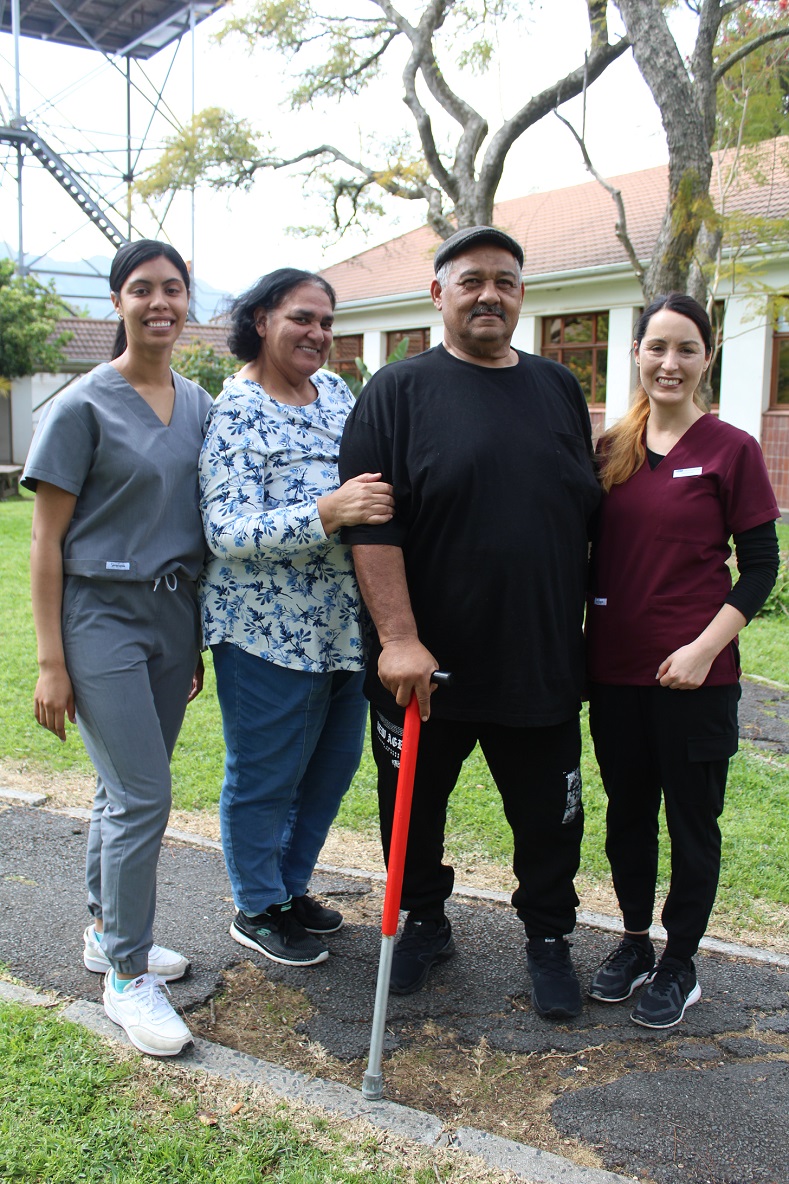
News
Deon Lackay defies the odds: beats stroke and slims down!
This Stroke Awareness Week (25 October – 1 November), we are calling on all the residents of the Western Cape to make healthier choices to reduce their risk of having a stroke. One incredible survivor, Mr Deon Lackay of Pniel, describes recovery after a stroke as a very challenging time. He realises that if he started to live a healthier lifestyle earlier on, he would not have had to fight for a year and a half to regain optimal functioning and his independence.
However, he looks back on his recovery with gratitude and says that the healthcare workers, the support of his family, and prayers brought him back to where he can again walk. Along his journey to recovery, he also lost approx. 60 kg and he is more active.
With Stroke Awareness Week, healthcare workers in the Stellenbosch area are celebrating Mr Lackay’s remarkable recovery. Together with Mr Lackay they ask people to safeguard their health. By following some basic guidelines, you can reduce your risk of having a stroke:
- Eat as healthy as possible, every day.
- Be physically active – regularly!
- Avoid drugs, alcohol, and smoking.
- Take your prescribed medication as advised.
- Visit your healthcare worker if you are concerned about any aspect of your health.
“I should have lived and eaten healthier,” says Lackay. “It took a stroke for me to realise this. I never listened when people warned me. I was very fat. I weighed almost 197 kg.”
He remembers how he experienced a strange feeling come over his head on 3 June 2022. Later he fell in his room, and the family called emergency services. “The ambulance was there swiftly. I was conscious and, because I was so big, I had to explain to the ambulance team how to get me out of the house.”
His wife, Adelaide, was with him, and remembers that when they got to Stellenbosch Hospital it was quickly determined that he had to go to Tygerberg Hospital. After 48 hours he was stabilised and transferred back to Stellenbosch Hospital. in light of his unique situation it was decided that he would be supported as an outpatient. Community health workers supported him with home visits and stayed in touch with experts at the hospital about his progress. He also followed an exercise programme at home to support his recovery.
“It was really difficult. I almost drank pills to take my own life,” he recalls about a time when he was very depressed because he was bedridden for months. To be confined to the house, to regain the functions of his one arm and leg, and master everyday tasks again, was very hard.
He is grateful for his wife, family and visitors who supported him. Eventually he was able to use a wheelchair, but that meant they had to make changes in the house so he could move around. When he struggled to transfer himself from the bed to the wheelchair or from the wheelchair to the bed or toilette, the physiotherapist and dietician based at Stellenbosch Hospital came to support him. “People have lots to say about the hospital but look at me! Here I am! An organisation like this cannot afford to lose people like them.”
For the first two months after the stroke, he could not stand the smell of food he used to enjoy. This helped him to start eating healthier. As part of his job he usually drove long distances, and he opted for the quickest, easiest meals. Because he was driving often, he was not very physically active.
When he thinks back to the days leading up to the stroke, he realises that he may have missed some of the warning signs. In the days leading up to the stroke he had a headache each morning (which was very unusual for him) and he felt very tired. He would take painkillers with an energy drink, and in the evening take more painkillers.
Signs that could indicate that you are having a stroke, include:
- A sudden, extreme headache;
- Sudden weakness in the arm and leg on one side of your body;
- Suddenly experiencing poor vision;
- Suddenly struggling to speak; and
- Your face drooping on one side.
People who notice these signs must go to a hospital immediately. A stroke is an emergency!
“You can’t really explain to someone what it is like to have a stroke. Also, there is no one who can do the work for you. It was a slow recovery. The first time I was able to use the toilette again, I had a picture taken so I could show Lorisha (the physiotherapist). When I could shower on my own for the first time, I shouted it out in the house! I look at life differently now. I go to the clinic as soon as I’m concerned about something. I follow the advice of healthcare workers to the letter, and I will not just take over the counter medication.”
Healthcare workers who supported him are all smiles about Deon’s recovery. “I remember the day when he was discharged. His wife said: In a year’s time Deon will walk in here and he will be skinnier…” says Ms Lenelle De Lange, the dietician at Stellenbosch Hospital. “I was worried that things would not turn out in his favour, but I believe it is his family’s support that made all the difference.”
Deon describes Lorisha and Lenelle (staff of Western Cape Government Health and Wellness at Stellenbosch Hospital) as two heroes on his road to recovery. He had a stroke at the age of 54. He lost 60 kgs and now his family also lives healthier. “If I still don’t believe there is a Man above, then I’m deliberately lying. Not everyone survives a stroke.”


